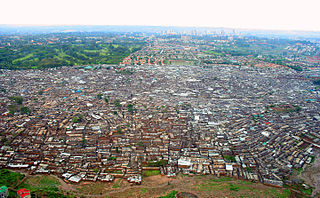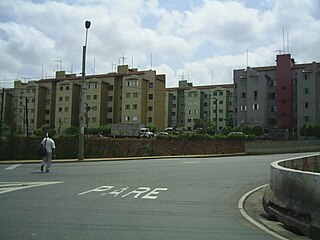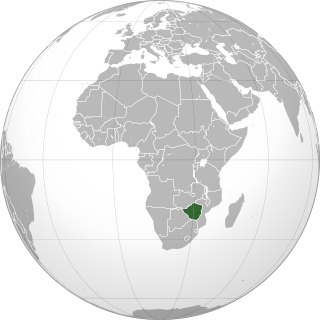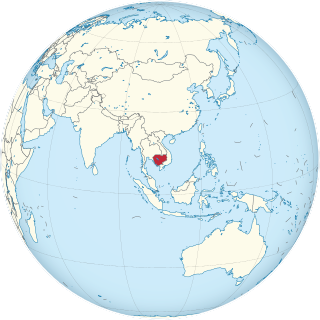Related Research Articles

Squatting is the action of occupying an abandoned or unoccupied area of land or a building, usually residential, that the squatter does not own, rent or otherwise have lawful permission to use. The United Nations estimated in 2003 that there were one billion slum residents and squatters globally. Squatting occurs worldwide and tends to occur when people who are poor and homeless find empty buildings or land to occupy for housing. It has a long history, broken down by country below.
A slum is usually a highly populated urban residential area consisting mostly of closely packed, decrepit housing units in a situation of deteriorated or incomplete infrastructure, inhabited primarily by impoverished persons. Although slums, especially in America, are usually located in urban areas, in other countries they can be located in suburban areas where housing quality is low and living conditions are poor. While slums differ in size and other characteristics, most lack reliable sanitation services, supply of clean water, reliable electricity, law enforcement, and other basic services. Slum residences vary from shanty houses to professionally built dwellings which, because of poor-quality construction and/or lack of basic maintenance, have deteriorated.
Slum clearance, slum eviction or slum removal is an urban renewal strategy used to transform low income settlements with poor reputation into another type of development or housing. This has long been a strategy for redeveloping urban communities; for example slum clearance plans were required in the United Kingdom in the Housing Act 1930, while the Housing Act of 1937 encouraged similar clearance strategies in the United States. Frequently, but not always, these programs were paired with public housing or other assistance programs for the displaced communities.

Kibera is a division of Nairobi Area, Kenya, and neighbourhood of the city of Nairobi, 6.6 kilometres (4.1 mi) from the city centre. Kibera is the largest slum in Nairobi, and the largest urban slum in Africa. The 2009 Kenya Population and Housing Census reports Kibera's population as 170,070, contrary to previous estimates of one or two million people. Other sources suggest the total Kibera population may be 500,000 to well over 1,000,000 depending on which slums are included in defining Kibera.
Capital punishment is a legal penalty in Egypt. The state carried out at least 44 executions in 2016, at least 35 in 2017, and at least 43 in 2018. On 8 September, 2020 a court in Egypt sentenced 75 people to death and 47 others to life imprisonment. They were charged with murder or membership in a terrorist group. The British newspaper Independent has reported that Najia Bounaim of Amnesty International Middle East and North Africa described the court's sentence to “disgraceful" and "a mockery of justice.". The method of execution is hanging for civilian convictions, and by firing squad for convictions by commissioned military personnel at the time of duty.

Heliópolis is a favela in the Sacomã district of São Paulo. It has around 200,000 inhabitants and has developed into a serviced neighbourhood from its beginnings as a squatted settlement in the 1970s.

Cardboard city was an informal settlement, or locally classified as unhygienic settlement, basically a slum in the capital of Serbia. It was located in Belgrade's municipality of Novi Beograd. The settlement was completely evicted and cleared in 2009.

Human rights in Egypt are guaranteed by the Egyptian Constitution under the various articles of Chapter 3. The country is also a party to numerous international human rights treaties, including the International Covenant on Civil and Political Rights and the International Covenant on Economic, Social and Cultural Rights. However, the state of human rights in the country has been criticized both in the past and the present, especially by foreign human rights organizations such as Amnesty International and Human Rights Watch, although the Egyptian government has frequently rejected such criticism. According to human rights groups, as of January 2020 there are some 60,000 political prisoners in Egypt. "The worst mass killing in Egypt’s modern history" occurred during the dispersal of a sit-in on 14 August 2013, when as many as 900 protesters were killed.

The Zabbaleen is a word which literally means "garbage people" in Egyptian Arabic. The contemporary use of the word in Egyptian Arabic is to mean "garbage collectors". In cultural contexts, the word refers to teenagers and adults who have served as Cairo's informal garbage collectors since approximately the 1940s. The Zabbaleen are also known as Zarraba, which means "pig-pen operators." The word Zabbalīn came from the Egyptian Arabic word zebāla which means "garbage".

Manshiyat Naser is a ward (kism) of Cairo, Egypt. It covers 5.54 square kilometers, was home to 262,050 people in the 2006 census, up from 168,425 in 1996 census, and borders Nasr City to the east, central Cairo districts to the west, and Khalifa ward to the south.

The City of the Dead, or Cairo Necropolis, also referred to as theQarafa, is a series of vast Islamic-era necropolises and cemeteries in Cairo, Egypt. They extend to the north and to the south of the Cairo Citadel, below the Mokattam Hills and outside the historic city walls, covering an area roughly 4 miles long. They are included in the UNESCO World Heritage Site of "Historic Cairo".

The KwaZulu-Natal Elimination and Prevention of Re-emergence of Slums Act, 2007 was a provincial law dealing with land tenure and evictions in the province of KwaZulu-Natal in South Africa.
The attack on Kennedy Road in Durban, South Africa, occurred on 26 September 2009. A mob of men armed with bush knives, guns and bottles entered the Kennedy Road informal settlement searching for leaders of the shackdwellers movement Abahlali baseMjondolo (AbM). They looted shacks and threatened residents, before attacking a hall where a youth meeting was happening. Two people were killed and around a thousand were displaced. In the aftermath, AbM representatives such as S'bu Zikode went into hiding and thirteen AbM members were arrested.

Ministry of Housing, Utilities and Urban Communities (MOHUUC) is the Egyptian ministry responsible for the construction, and infrastructure of urban communities and utilities. Its headquarters are located in Cairo and Mostafa Madbouli has served as minister since 2014. This ministry works in affiliation with the New Urban Communities Authority.
Slums are traditionally described as dense urban settlements, usually displaying characteristics such as crowded and compact housing units, informal delivery of utilities, and unofficial recognition by local government. In the Philippines, residents of slum areas are commonly referred to as "squatters" and have historically been subject to relocation or forced demolition. With a steadily growing metropolitan area, Metro Manila is subject to a densifying population of slum dwellers—a 2014 article states that Manila has an estimated 4 million people living in slums, out of a total population of 21.3 million.
Ezbet Bekhit is a community located in Manshiyat Naser. As of 2003, it has a population of 37,000. On September 6, 2008, residents were forced to leave the community following the 2008 Cairo landslide.

Squatting in Zimbabwe is the settlement of land or buildings without the permission of the owner. Squatting began under colonialism. After Zimbabwe was created in 1980, peasant farmers and squatters disputed the distribution of land. Informal settlements have developed on the periphery of cities such as Chitungwiza and the capital Harare. In 2005, Operation Murambatsvina evicted an estimated 700,000 people.

Squatting in Ghana is the occupation of unused land or derelict buildings without the permission of the owner. Informal settlements are found in cities such as Kumasi and the capital Accra. Ashaiman, now a town of 100,000 people, was swelled by squatters. In central Accra, next to Agbogbloshie, the Old Fadama settlement houses an estimated 80,000 people and is subject to a controversial discussion about eviction. The residents have been supported by Amnesty International, the Centre on Housing Rights and Evictions and Shack Dwellers International.

Squatting in Angola occurs when displaced peoples occupy informal settlements in coastal cities such as the capital Luanda. The Government of Angola has been criticized by human rights groups for forcibly evicting squatters and not resettling them.

Squatting in Cambodia is the occupation of derelict buildings or unused land without the permission of the owner. Following the Khmer Rouge and the Pol Pot regime, the new democratic government introduced land reform. In the capital Phnom Penh, where in 2003 an estimated 25 per cent of the population was squatting, there are informal settlements and occupied buildings. Land disputes and evictions are common across the country. Squatters are known officially as the "urban poor" or "temporary residents".
References
- 1 2 Egypt jails government officials over Cairo rockslide BBC
- 1 2 Following the rockfall, Egyptian slum dwellers have little more than hope Christian Science Monitor, March 20, 2009.
- 1 2 Cairo's poorest risk being buried alive in their homes Amnesty International
- ↑ Emaar accused of culpability in Duweiqa rockslide Archived September 27, 2008, at the Wayback Machine Daily News, Egypt.
- ↑ Compounding the Loss Archived 2009-08-07 at the Wayback Machine Al-Ahram, Egypt.
- ↑ "Egypt's Deadly Infrastructure Problems". Archived from the original on 2009-11-20. Retrieved 2009-11-20.
- ↑ "Egypt: Buried alive; trapped by poverty and neglect in Cairo's informal settlements". ReliefWeb. 2009-11-12. Retrieved 2016-04-29.